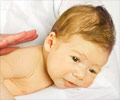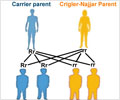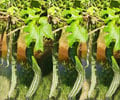Neonatal jaundice can be serious if untreated, potentially leading to brain damage or other risks.

Development and Validation of a Smartphone Application for Neonatal Jaundice Screening
Go to source)
BiliSG©: Smartphone Jaundice Screening
The app, BiliSG©, was named after bilirubin, a yellow pigment resulting from the natural breakdown of red blood cells that causes the yellow tint seen in jaundice. It utilises a machine learning model to predict bilirubin levels in multi-ethnic Asian newborns through skin colour analysis. By capturing images with a smartphone camera of the infant's forehead, chest, and abdomen with a specially designed colour-calibration sticker, the app’s algorithm can analyse the skin’s yellowness to accurately predict bilirubin levels.‘#Jaundice screening just got a whole lot easier! #BiliSG© is a new smartphone app that uses #AI to detect jaundice in babies by analyzing their skin color.’





Principal investigator Clinical Assistant Professor Alvin Ngeow, Senior Consultant, Department of Neonatal and Developmental Medicine, SGH, said, “An app to screen neonatal jaundice is not new. Most of them, however, only take a single point of reference such as the forehead to determine if the newborn has jaundice. In fact, a newborn with jaundice can have varying degree of yellowness in different parts of the body. Furthermore, the other apps were developed in other countries on babies who may have skin tones that are different from that of the local population, a factor that has bearing on accuracy. This prompted us to develop our own app, BiliSG©.” The study was conducted in two phases: Phase 1 from June 2022 to October 2023 focused on app development and initial machine learning model creation, while model validation was performed in Phase 2 from November 2023 to June 2024.
For Phase 2, during the iterative development of the machine learning model, SGH and SHP recruited 352 clinically stable infants born at 35 weeks of pregnancy or more and within 21 days of age. Enrolled infants underwent three forms of jaundice tests1. For the third test, photos of the forehead, chest, and abdomen were taken with smartphone-based BiliSG©. When the machine learning model was finalised in April 2024, another 194 infants were prospectively recruited to further validate the app. The team found that the app gave similar results when compared to existing methods of NNJ testing, with 100 percent sensitivity.
Senior author Clinical Associate Professor (Dr) Tan Ngiap Chuan, Director of Research and Primary Care Research Institute (PCRI), SHP and Vice-chair, Research, SingHealth-Duke NUS Family Medicine Academic Clinical Programme (FM ACP), added, “This novel tool will be a game changer in infant care in Singapore and beyond. It will transform the way we protect the brain health of babies by ensuring their jaundice is monitored closely by their parents in convenient setting and with the safeguard and supervision of their family doctors via telemedicine.”
Neonatal jaundice is a condition that affects 60 percent of term and 80 percent of pre-term infants. Some ethic groups have a higher incidence. It occurs when a baby has a high level of bilirubin in their blood as their liver may not be developed enough to remove the substance. The condition is usually self-limiting and bilirubin levels typically reach safe levels after the baby’s first two to three weeks. However, early detection and regular monitoring is recommended as severe jaundice can cause permanent brain damage, and other long-term complications, such as intellectual and motor disabilities as well as developmental delays.
Advertisement
Moving forward, the team is looking at conducting further validation of the app on a wider range of smartphone operating systems and camera specifications, and a pilot study to assess the app’s clinical feasibility.
Advertisement
- Development and Validation of a Smartphone Application for Neonatal Jaundice Screening - (https://jamanetwork.com/journals/jamanetworkopen/fullarticle/2827752)














